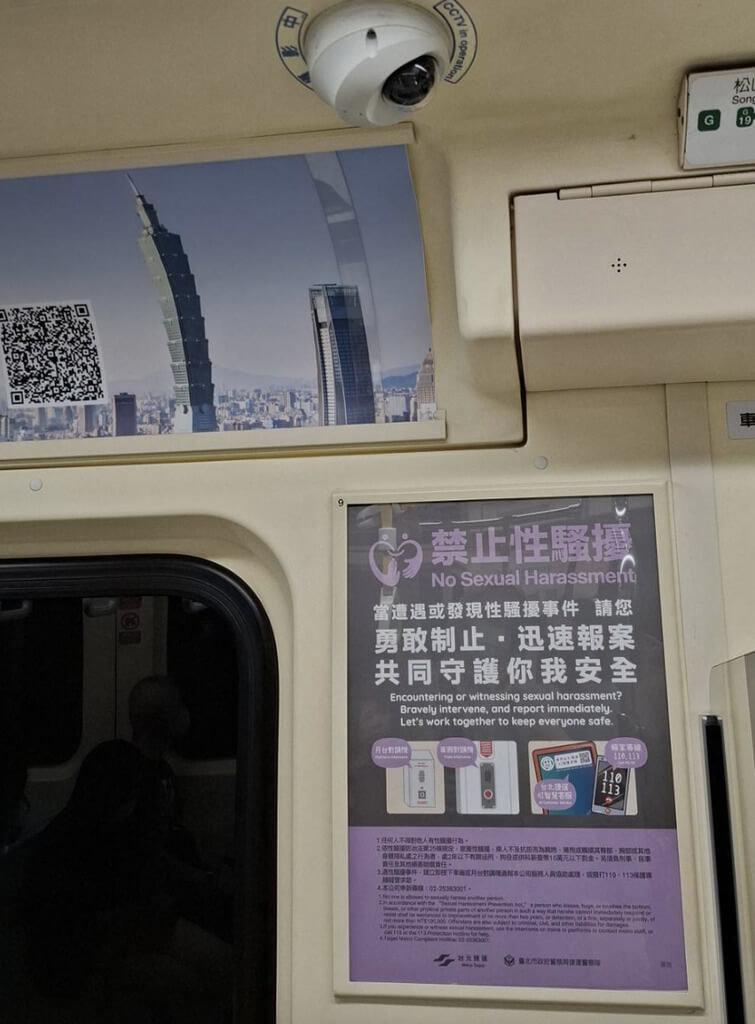From January to the end of May, 55 cases of sexual harassment and 25 cases of secret photography were reported on the Taipei metro, data from the Rapid Transit Division of the Taipei Police Department showed.
Taipei Rapid Transit Corp yesterday said that sexual harassment and secret photography are illegal and called on victims and witnesses to "bravely intervene and report immediately.”
Last year there were 72 reports of sexual harassment and 55 reports of secret photography on the transit system, it said, adding that the metro carries an average of 2 million passengers per day.

Photo courtesy of Taipei Rapid Transit Corp via CNA
Passengers encountering or witnessing sexual harassment may use the intercom systems on trains or platforms to notify staff or the operations control center, or they may report the incident using the Taipei Metro app’s AI customer service feature or call the 110 or 113 hotlines for help, it said.
While in stations, passengers may also notify station staff directly, it added.
Staff would protect those involved, file a police report and cooperate with investigators, it said.
The company said it would continue to post anti-sexual harassment posters in English and Chinese, which provide information on reporting hotlines and penalties.
The posters warn passengers that sexual harassment is punishable by up to two years in prison and fines of up to NT$100,000 under the Sexual Harassment Prevention Act (性騷擾防治法).
Offenders are also subject to criminal, civil and other liabilities or damages.
All stations and train carriages have CCTV monitoring and station patrols are conducted regularly, it added.

Three Taiwanese airlines have prohibited passengers from packing Bluetooth earbuds and their charger cases in checked luggage. EVA Air and Uni Air said that Bluetooth earbuds and charger cases are categorized as portable electronic devices, which should be switched off if they are placed in checked luggage based on international aviation safety regulations. They must not be in standby or sleep mode. However, as charging would continue when earbuds are placed in the charger cases, which would contravene international aviation regulations, their cases must be carried as hand luggage, they said. Tigerair Taiwan said that earbud charger cases are equipped

Foreign travelers entering Taiwan on a short layover via Taiwan Taoyuan International Airport are receiving NT$600 gift vouchers from yesterday, the Tourism Administration said, adding that it hopes the incentive would boost tourism consumption at the airport. The program, which allows travelers holding non-Taiwan passports who enter the country during a layover of up to 24 hours to claim a voucher, aims to promote attractions at the airport, the agency said in a statement on Friday. To participate, travelers must sign up on the campaign Web site, the agency said. They can then present their passport and boarding pass for their connecting international

Temperatures in northern Taiwan are forecast to reach as high as 30°C today, as an ongoing northeasterly seasonal wind system weakens, the Central Weather Administration (CWA) said. CWA forecaster Tseng Chao-cheng (曾昭誠) said yesterday that with the seasonal wind system weakening, warmer easterly winds would boost the temperature today. Daytime temperatures in northern Taiwan and Yilan County are expected to range from 28°C to 30°C today, up about 3°C from yesterday, Tseng said. According to the CWA, temperature highs in central and southern Taiwan could stay stable. However, the weather is expected to turn cooler starting tonight as the northeasterly wind system strengthens again

Taiwan sweltered through its hottest October on record, the Central Weather Administration (CWA) said yesterday, the latest in a string of global temperature records. The main island endured its highest average temperature since 1950, CWA forecaster Liu Pei-teng said. Temperatures the world over have soared in recent years as human-induced climate change contributes to ever more erratic weather patterns. Taiwan’s average temperature was 27.381°C as of Thursday, Liu said. Liu said the average could slip 0.1°C by the end of yesterday, but it would still be higher than the previous record of 27.009°C in 2016. "The temperature only started lowering around Oct. 18 or 19